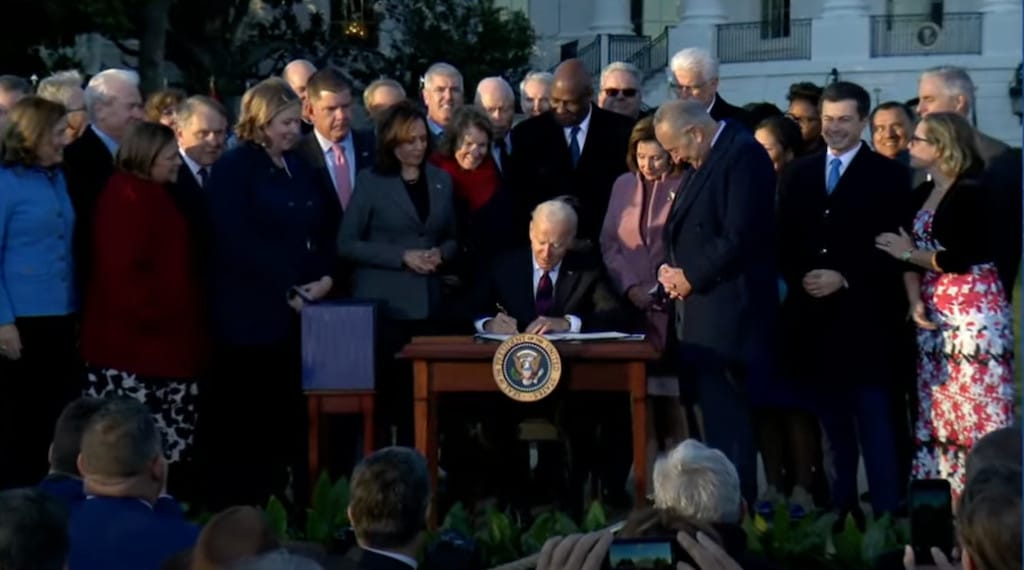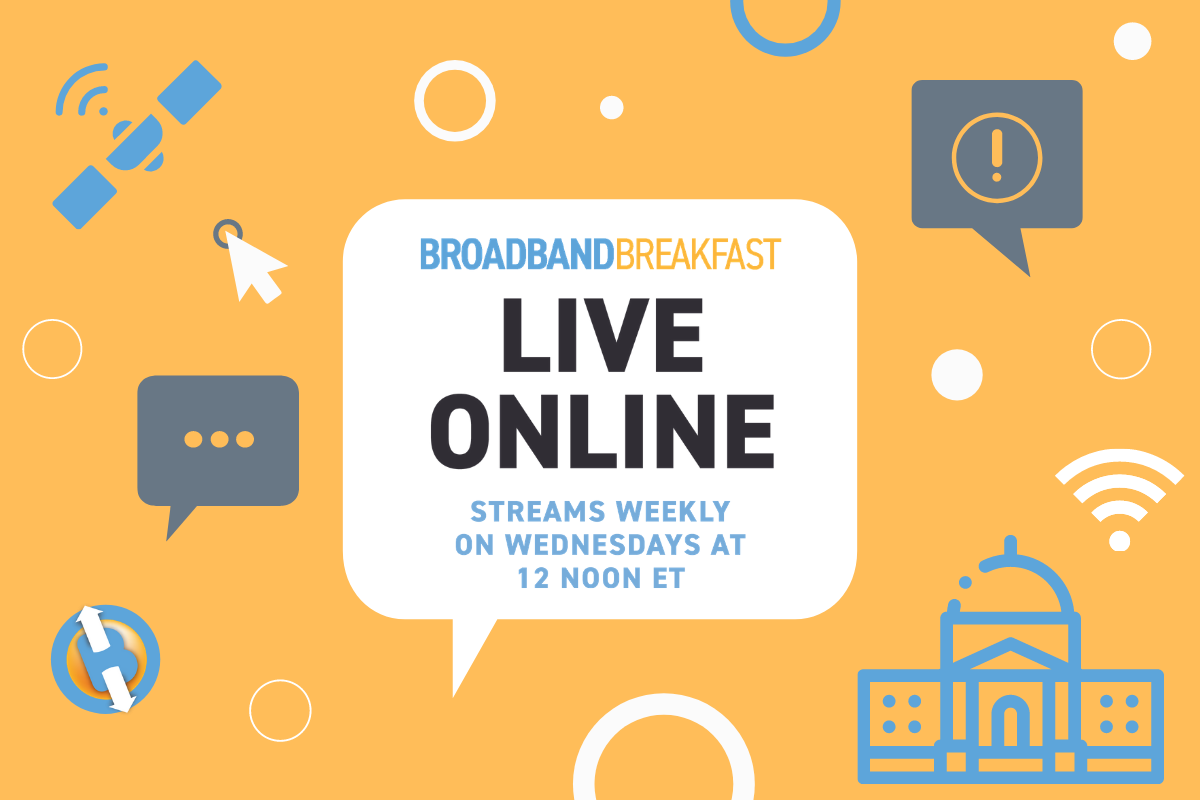Infrastructure Bill Brings New Focus on Decision Making at Community Level
Funneling of infrastructure funds through states differs from Obama-era broadband programs.
T.J. York

WASHINGTON, January 24, 2022 – Community broadband advocates say the ability for local governments to decide what can be done with broadband money from the recently-enacted Infrastructure Investment and Jobs Act is the best way to manage federal funds for broadband expansion efforts.
During a Broadband Breakfast Live Online event on Wednesday, leaders at community broadband advocacy group Institute for Local Self-Reliance said this sets up a local community-based approach to connectivity, bypassing some of the issues with the Federal Communications Commission’s limited broadband maps.
Sean Gonsalves, a senior reporter, editor and researcher at the ILSR, said that local communities are the best source of information on where within their boundaries there are connectivity issues – far surpassing the knowledge of the FCC’s maps.
The infrastructure legislation, which became law in November, will provide a minimum of $100 million to each of the states to use toward broadband expansion. The states that have applied for American Rescue Plan money now have heaps of cash to work with fully connected their boundaries with high-speed internet.
Christopher Mitchell, director of the ILSR, said Wednesday that for many states the law “may solve almost all their rural broadband problems.”
Local approaches may also make it easier to hold accountable officials who do not effectively spend IIJA funds, Mitchell said, adding that was one component of the law that was missing from the FCC’s Rural Digital Opportunity Fund.
Broadband Breakfast Editor and Publisher Drew Clark stated that the law’s structure of funneling money through states is noteworthy, as the notion of responsibility for individual states to enforce policy has long been a “conservative talking point.”

The panel noted that like RDOF, the Broadband Technology Opportunities Program from Barack Obama’s presidency also differed from the IIJA in that it did not rely on individual states to dispense funds.
Mitchell attributes these differences in the IIJA in part to general trends toward decentralization in policy.
Our Broadband Breakfast Live Online events take place on Wednesday at 12 Noon ET. You can watch the January 19, 2022, event on this page. You can also PARTICIPATE in the current Broadband Breakfast Live Online event. REGISTER HERE.
Wednesday, January 19, 2022, 12 Noon ET — The Community Broadband Network Approach to Infrastructure Funding
Community broadband networks will play a crucial role in the implementation of the Infrastructure, Investment and Jobs Act, particularly the Broadband Equity, Access and Deployment program, and the Digital Equity Act. This vital session of Broadband Breakfast Live Online will bring our friends from MuniNetworks.org, the Community Broadband Networks Initiative of the Institute for Local Self Reliance, to discuss the issues, trends and concerns they are following. What open questions remain about the IIJA rules? How do the Treasury Department’s rules on the State & Local Fiscal Recovery Funds program interact with the IIJA program? What concerns should community networks have about the next stages of federal funding in their states?
Panelists for this Broadband Breakfast Live Online session:
- DeAnne Cuellar, Community Broadband Outreach Team Lead, ILSR’s Community Broadband Network Initiative
- Sean Gonsalves, Senior Reporter, Editor and Researcher, ILSR’s Community Broadband Network Initiative
- Ry Marcattilio-McCracken, Senior Researcher, ILSR’s Community Broadband Network Initiative
- Christopher Mitchell, Director, ILSR’s Community Broadband Network Initiative
- Drew Clark (moderator), Editor and Publisher, Broadband Breakfast
Please note: Our event on “State Broadband Officials and the Broadband Infrastructure Surge” has been moved to February 16, 2022.
Panelist resources:
- Christopher Mitchell: Treasury Department Rescue Plan Act Rules Improve Broadband Funding, Broadband Breakfast, January 13, 2022

DeAnne Cuellar is a tech equity advocate and communications strategist from San Antonio, Texas. She served as Mayor Ron Nirenberg’s digital inclusion appointee to the City of San Antonio’s Innovation & Technology Committee, resulting in several policy and funding priorities to close the digital divide. As a social impact entrepreneur, she co-founded several cross-sector nonprofit initiatives, advocating for justice, equity, diversity, and inclusion for historically underrepresented communities.
Sean Gonsalves is a longtime former reporter, columnist, and news editor with the Cape Cod Times. He is also a former nationally syndicated columnist in 22 newspapers, including the Oakland Tribune, Kansas City Star and Seattle Post-Intelligencer. His work has also appeared in the Boston Globe, USA Today, the Washington Post and the International Herald-Tribune. Sean joined the Institute for Local Self Reliance staff in October 2020 as a senior reporter, editor and researcher for ILSR’s Community Broadband Network Initiative.
Ry Marcattilio-McCracken is Senior Researcher with the Institute for Local Self-Reliance’s Community Broadband Networks Initiative. He is interested in the democratizing power of technology, systems engineering, and the history of science, technology, and medicine. Previously, Ry worked as an Adjunct Professor of American History in Oklahoma, Rhode Island, and Minnesota. Ry holds a Ph.D. in American History from Oklahoma State University.
Christopher Mitchell is the Director of the Community Broadband Networks Initiative with the Institute for Local Self-Reliance in Minneapolis. Mitchell, a leading national expert on community networks, Internet access, and local broadband policies, built MuniNetworks.org, the comprehensive online clearinghouse of information about local government policies to improve Internet access. Its interactive community broadband network map tracks more than 600 such networks. He also hosts audio and video shows online, including Community Broadband Bits and Connect This!, and Public Knowledge presented Christopher with its Internet Protocol award in 2021, which honors those who have made significant contributions to Internet policy.
Drew Clark is the Editor and Publisher of BroadbandBreakfast.com and a nationally-respected telecommunications attorney. Drew brings experts and practitioners together to advance the benefits provided by broadband. Under the American Recovery and Reinvestment Act of 2009, he served as head of a State Broadband Initiative, the Partnership for a Connected Illinois. He is also the President of the Rural Telecommunications Congress.
WATCH HERE, or on YouTube, Twitter and Facebook.

As with all Broadband Breakfast Live Online events, the FREE webcasts will take place at 12 Noon ET on Wednesday.
SUBSCRIBE to the Broadband Breakfast YouTube channel. That way, you will be notified when events go live. Watch on YouTube, Twitter and Facebook.
See a complete list of upcoming and past Broadband Breakfast Live Online events.











Member discussion